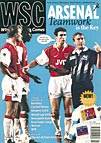 Falkirk's future is in the balance, explains Paul Hutton
Falkirk's future is in the balance, explains Paul Hutton
To put it mildly, the last 12 months have been interesting for Falkirk supporters. There was the Scottish Cup Final last May, the semi-finals this year, and we’ve been involved in the First Division promotion battle for most of this season. And, of course, the club went into liquidation on the March 19th.
Needless to say, this was quite a shock for most supporters. Nobody thought Falkirk were awash with cash, after all we’ve spent most of the season reading about unpaid bills, seen some of our squad report the club to the players’ union (SPFA) because of unpaid bonuses and have laboured most of the season under a Scottish FA imposed transfer ban. Still, like most fans, I was working on the theory that last season’s cup run had made a pretty big hole in the club’s historic debt and left us with a deficit in the region of £750,000. Certainly big, but not necessarily fatal if you’ve reached the semi-finals of the cup again, and have a reasonable chance of finishing second in the division with whatever benefit that might bring. Sadly, things were just that bit worse.
Although we were initially told that the club had gone into voluntary liquidation, it soon turned out this wasn’t exactly the case. By the evening of the 19th it was clear that the club was, in fact, £1.5 million in debt, with £400,000 of that being owed to the Inland Revenue who had run out of patience and called in the liquidator.
This left the club in a rather odd situation – in effect all previous debts have been put aside to be dealt with later. The liquidator’s job is simply to keep the club trading until a buyer can be found, but he doesn’t have the luxury of being to ask the bank for a quick overdraft. With little money coming into the club (the next home game wasn’t due until April 11th) the liquidator had no option but to tell staff – players included – that they weren’t getting paid.
This meant that the club was immediately in breach of contract with its playing staff. Any of them could have walked out on the club at that point. After a meeting between the players, the liquidator and SPFA secretary Tony Higgins, the players agreed to play the first week for nothing, and accept half wages until the end of the season.
In the event Partick Thistle, themselves no strangers to financial worries this season, came to our rescue by bringing forward a match to give us some income. Off the pitch, a trust fund was created which can be used to pay the players’ wages, and a campaign has been set up to keep money coming into that fund. The liquidator, meanwhile, is very hopeful that Falkirk will attract a buyer – by his own reckoning it’s the first time that a football club in Britain can be bought without any outstanding debt being involved, and there’s already talk of four interested groups. It does mean we are unlikely to be playing at Brockville next season – its sale being the only way creditors of the old company might get some of their money back.
Essentially though, it’s the Scottish League and the SFA that will decide Falkirk’s future. In the outside world businesses go into liquidation and move into new ownership every day, but the football authorities in Scotland never allow a club to change hands without existing debt being carried over. They don’t actually have any rules that force them to do that, they’ve just always done things that way. Though the consequences of doing so have been pointed out to them, they may yet choose to follow habit and saddle Falkirk’s new owners with £1.5 million of debt. Without doubt, that would be the end of the club.
From WSC 135 May 1998. What was happening this month